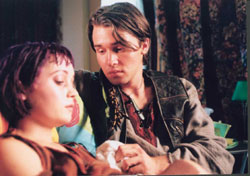This week we take a look at depression.
Please remember that the following information is merely a guideline and that if you need to find out more about symptoms and treatment , seek professional help.
What is it?
 Depression is an illness that affects 1 in 5 people during their lifetime. It can range from short- term to long-term and from mild to extremely severe, sometimes resulting in armful, suicidal thoughts and actions.
Depression is an illness that affects 1 in 5 people during their lifetime. It can range from short- term to long-term and from mild to extremely severe, sometimes resulting in armful, suicidal thoughts and actions.
Depression is the leading cause of substance and alcohol abuse.
Clinical depression is very different from feeling ‘low’ and professional help should always be sought. Depression is not something that you can ‘snap’ yourself out of nor is it something you can get over completely on your own.
Depression is actually the result of a chemical imbalance in the brain. This imbalance might be genetic or down to stress from a traumatic situation.
What kinds of depression are there?
There are a lot of different types of depression. It can be clinical, severe, manic, post natal, post traumatic, etc.
It is really important to seek help as soon as possible so that the correct treatment can be given.
What causes it?
Depression might run in the family although that does not necessarily mean that you will suffer its affects. Pain or something major that has happened in your life might trigger it.
Some triggers might include:
Bereavement
Unemployment
Redundancy
Retirement
Financial loss
Marital / relationship problems
Loneliness
Childbirth
A major operation
Illness / physical pain
Disability
Being involved in a major disaster
What are the symptoms?
Depression
Confusion
Feelings of isolation
Anger or impatience in ‘bursts’
Decreased energy
Sudden increase or decrease in eating habits
Feelings of hopelessness
Fatigue
Tearfulness
Feelings of ’emptiness’
Restlessness
Forgetfulness
Paranoia
Over-sensitivity
Vulnerability
Severe depression
Lack of interest in food or drink
Suicidal thoughts or actions
Delusions
Hallucinations
Symptoms of mania
Severe insomnia (not being able to sleep)
Increased ‘frantic’ talking
Poor judgment
Racing, non-related jumbled thoughts
Feelings of grandeur (thinking you’re better than everybody else)
Feelings of elation
Irritability at inappropriate things
Strange or improper social behaviour
 Things you might notice if a friend/relative of yours is depressed
Things you might notice if a friend/relative of yours is depressed
Sometimes it is hard to notice changes in somebody’s personality or behaviour. The person might have changed subtly over a period of time or perhaps they are just good at masking things from those who are close to them.
It is hard to ignore the symptoms of depression however, especially if it is severe. You might notice the following symptoms and think that the person is abusing drugs or has an eating disorder because some of the behaviours are similar.
If you ever feel that a friend or relative has become a totally different person, talk to them and try to get them to seek professional help. This might be an uphill battle for you because sometimes the person doesn’t believe that there is anything wrong with them. Or they could be embarrassed to admit that there is a problem. They would probably also feel scared to see a professional because most people have a fear of going crazy.
The following is a list of typical behaviours to look out for in depressive people:
Sudden mood changes, often for no apparent reason
Change or loss of interest in activities
Sudden lack of interest in hygiene or clean clothes
Possessiveness
Difficulty in carrying on with conversations
Clinginess
Avoiding friends, families and other social situations

